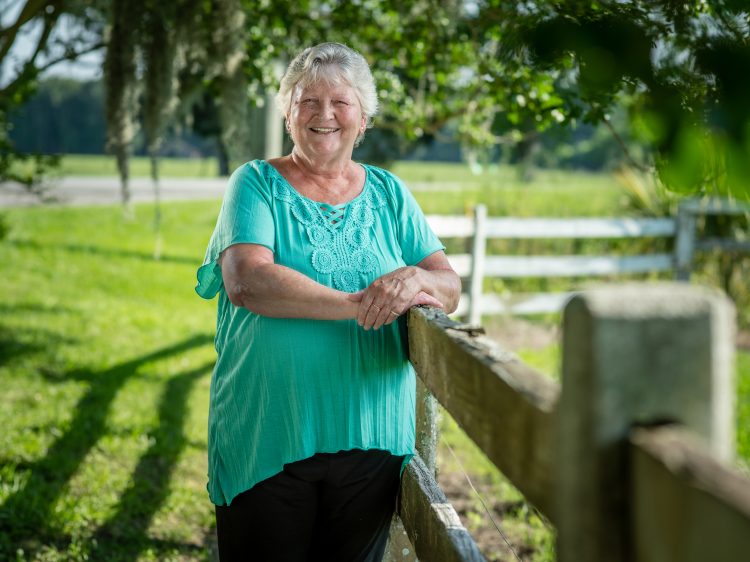In 2016, I was a full-time caregiver for my mother while she was in hospice care at home. During that time, my skin started breaking out. I thought it was just a rash triggered by stress. I was helping my mother 24/7, and I admittedly wasn’t taking the best care of myself. I was sweating a lot, doing things like moving her from her wheelchair to the bed. I didn’t even know what moderate-to-severe plaque psoriasis was at that time. I just slapped some ointment on the rash area and moved on.
After my mother passed away, the symptoms started to become extremely severe and painful. The rashes and flakes covered the majority of my body — literally everywhere except my face. I still had no idea what was going on, and my family sort of thought it was a reaction to my mother’s death. I was definitely grieving the loss of my best friend. Eventually my sister took me to a clinic, where I was incorrectly diagnosed with a yeast infection … the treatment for which did not help my psoriasis. Then we visited a PA at the doctor’s office; by this time, all I could wear comfortably on my feet were men’s slippers. The symptoms had grown unbearable over the last few months, and I felt exhausted. This time I was given more ointment and sent on my way. Once again, my symptoms got worse. Needless to say, I was miserable and starting to lose hope.

There was one week where I spent every day in bed. My son would give me orange juice before he left for work, then come home and make me a microwave dinner. Between that and some animal crackers, that’s all I ate during the day. The only thing that did get me out of bed was letting my animals out and back in. This was probably the darkest time for me. I used to love swimming in the pool at my complex, and I stopped going because of my appearance. I felt like I looked contagious. I stopped doing the storytelling program I loved to do. I love nature, but I couldn’t walk anymore. I didn’t want to see friends or go out to dinner with anyone. The one time I did, I left so many skin flakes on the chair I was sitting in. I was so embarrassed and sad about not being able to do anything, even my own children didn’t want to talk to me. They knew that I wasn’t even close to myself, since I didn’t want to talk to them either. It felt very isolating; I was consumed by my pain and my grief over losing my mother and best friend.
About a year later in summer 2017, I drove myself to the ER. I had reached a breaking point within myself and had to take action to figure out what was going on. I arrived in tears, and when they took me back, the doctor’s intern immediately told me I had psoriasis. They instructed me to see a dermatologist as soon as possible and prescribed a steroid to help with the unbearable symptoms. When my sister and her husband arrived at the hospital to meet me, they saw those same white flakes when I got up from my chair. That’s when it clicked for everyone just how serious this was. By the time we got to the parking lot, my sister’s husband was on the phone with the family’s dermatologist, demanding that I be squeezed in for an appointment.
As I started to learn more about moderate-to-severe plaque psoriasis, I realized that it is so much more than a skin condition. Moderate-to-severe plaque psoriasis is an immune-mediated disease that causes your immune system to be overactive and form new skin cells that have nowhere to go. So, you break out in these horrible, silvery, itchy flakes, and they cause your body parts to swell.1 It’s painful. It’s miserable. I was diagnosed with moderate-to-severe plaque psoriasis though I immediately related to the severe part of my diagnosis. The dermatologist started me on a treatment straight away, along with ointments to help curb the symptoms.
It took about three months for me to start seeing enough improvement to be able to go back to my volunteer storytelling program that I love to do. Prior to treatment, I didn’t have the strength or energy to focus on learning a story, and I didn’t feel presentable at all to be in front of an audience. Now I was in better spirits, experiencing less pain and able to participate again. However, during the few years that I was on topical treatment, I would still have difficult flare-ups when I felt stressed, and it concerned me that my symptoms were still acting up. Did I want to do this for the rest of my life?
I started doing my own research on biologic options to hopefully find something new to try and stumbled upon ILUMYA® (tildrakizumab-asmn) when searching online. ILUMYA® is a prescription medicine used to treat adults with moderate to severe plaque psoriasis who may benefit from taking injections, pills (systemic therapy), or phototherapy (treatment using ultraviolet or UV light). I researched the most common side effects, which include upper respiratory infections, injection site redness and diarrhea. I consulted with my dermatologist, but also had this gut feeling that ILUMYA® would be a good option for me. The treatment felt promising, so I started to research insurance coverage options. I was excited to learn that ILUMYA® would be covered for me under Medicare Part B. After all my dermatologist and my research, I decided to give it a shot … and I’m glad I did. While some patients might experience side effects, I did not.
My skin eventually started to clear, and the less moderate-to-severe plaque psoriasis symptoms I had, the more I started enjoying being active. I stopped missing important events and spent time with my family again. The first test for me was when I made it through the stressful holidays and busy work season without a flare-up. I soon realized that I don’t even think about having a flare-up anymore. I finally had something to help me get back to doing daily activities. One of the best parts was that I didn’t have that daily reminder that I used to have with pills and ointments and creams and lotions. After the first two doses, I have only had an injection four times a year. I don’t have to think about it every day, which is a huge relief for me.
When I meet with other patients, we all have similar journeys to find a long-lasting treatment. While it’s comforting to hear other people have gone through the same hoops that I have, I also don’t want anyone to experience what I did, for as long as I did. If someone were living with flare-ups, I’d tell them to speak with their dermatologist about biologic treatments for moderate-to-severe plaque psoriasis. If you’re on Medicare like me – I just turned 65 years old – there are great options to get it covered. And if you’re still trying to figure out if you do have moderate-to-severe plaque psoriasis, don’t go to urgent care. Go directly to a dermatologist. Find out what’s going on. It could be moderate-to-severe plaque psoriasis or it could be something else, and you’ll get an answer either way.
I heard a quote once in an interview, and I try to live by it in my everyday life: I would not describe myself as a happy person. I describe myself as a cheerful person. A happy person has no worries. A cheerful person has worries but has learned how to manage them. You know, everyone’s going to have troubles. But if you learn how to manage them, then you’re going to remain cheerful and optimistic. I feel like I’m back. I spend more time with my children, and we’re having fun together again. I’ve even gone dancing with them! I’m also able to talk about my moderate-to-severe plaque psoriasis openly now. I told my hairdresser about it, and she gave me some great hair tips, because her father has psoriasis. Don’t hide it. You can help someone. You never know.
To learn more about Nancy’s story and other ILUMYA® patients visit www.ilumya.com/patient-stories.
INDICATIONS
ILUMYA® is a prescription medicine used to treat adults with moderate to severe plaque psoriasis who may benefit from taking injections, pills (systemic therapy), or phototherapy (treatment using ultraviolet or UV light).
Healthcare providers should check the patient for infections and tuberculosis before starting treatment with ILUMYA®. Before starting any treatment, patients should talk to their doctor and review the important safety information to understand the potential risks. The most common (≥1%) adverse reactions associated with ILUMYA® are upper respiratory infections, injection site reactions, and diarrhea.
IMPORTANT SAFETY INFORMATION
ILUMYA® (tildrakizumab-asmn) is a prescription medicine used to treat adults with moderate to severe plaque psoriasis who may benefit from taking injections, pills (systemic therapy), or phototherapy (treatment using ultraviolet or UV light).
What is the most important information I should know about ILUMYA?
Do not use ILUMYA if you have had a severe allergic reaction to ILUMYA or any of its ingredients.
Get emergency medical help right away if you get any of the following symptoms of a serious allergic reaction:
- feel faint
- trouble breathing or throat tightness
- swelling of your face, eyelids, lips, mouth, tongue or throat
- chest tightness
- skin rash
ILUMYA is a medicine that may lower the ability of your immune system to fight infections and may increase your risk of infections. Your healthcare provider should check you for infections and tuberculosis (TB) before starting treatment with ILUMYA and may treat you for TB before you begin treatment with ILUMYA if you have a history of TB or have active TB. Your healthcare provider should watch you closely for signs and symptoms of TB during and after treatment with ILUMYA.
Tell your healthcare provider right away if you have an infection or have symptoms of an infection, including:
- fever, sweats, or chills
- muscle aches
- weight loss
- cough
- warm, red, or painful skin or sores on your body different from your psoriasis
- diarrhea or stomach pain
- shortness of breath
- burning when you urinate or urinating more often than normal
- blood in your phlegm (mucus)
Before receiving ILUMYA, tell your healthcare provider about all of your medical conditions, including if you:
- have any of the conditions or symptoms listed in the section “What is the most important information I should know about ILUMYA?”
- have an infection that does not go away or that keeps coming back
- have TB or have been in close contact with someone with TB
- recently received or are scheduled to receive a vaccine (immunization). You should avoid receiving live vaccines during treatment with ILUMYA.
- are pregnant or plan to become pregnant. It is not known if ILUMYA can harm your unborn baby.
- are breastfeeding or plan to breastfeed. It is not known if ILUMYA passes into your breast milk.
Tell your healthcare provider about all the medicines you take, including prescription and over-the-counter medicines, vitamins, and herbal supplements.
It is not known if ILUMYA is safe and effective in children under 18 years of age.
What are the possible side effects of ILUMYA?
ILUMYA may cause serious side effects. See “What is the most important information I should know about ILUMYA?”
The most common side effects of ILUMYA include: upper respiratory infections, injection site reactions and diarrhea. These are not all of the possible side effects of ILUMYA. Call your doctor for medical advice about side effects.
You are encouraged to report any negative side effects of ILUMYA to FDA. Visit www.fda.gov/medwatch or call 1-800-FDA-1088. You are also encouraged to report side effects or ADEs (adverse drug events) to our Drug Safety Department at 1-800-406-7984 or drug.safetyUSA@sunpharma.com (preferred) with as much information as available.
Please read the full Prescribing Information and Medication Guide for ILUMYA and discuss any questions with your doctor.
Support Programs
ILUMYA® Early Access Program: For those with commercial insurance but your coverage has been delayed or denied, they may be eligible to receive ILUMYA® for free for up to 2 years. Commercially insured patients are automatically added to the Early Access Program through enrollment in ILUMYA SUPPORT®.
ILUMYA® Co-Pay Program: For those with commercial insurance that covers prescriptions, they may be able to pay as little as $5 per dose.
ILUMYA® Patient Assistance Program: For those without insurance coverage or who do not have insurance at all, you may be able to receive ILUMYA® for free.
Sources


